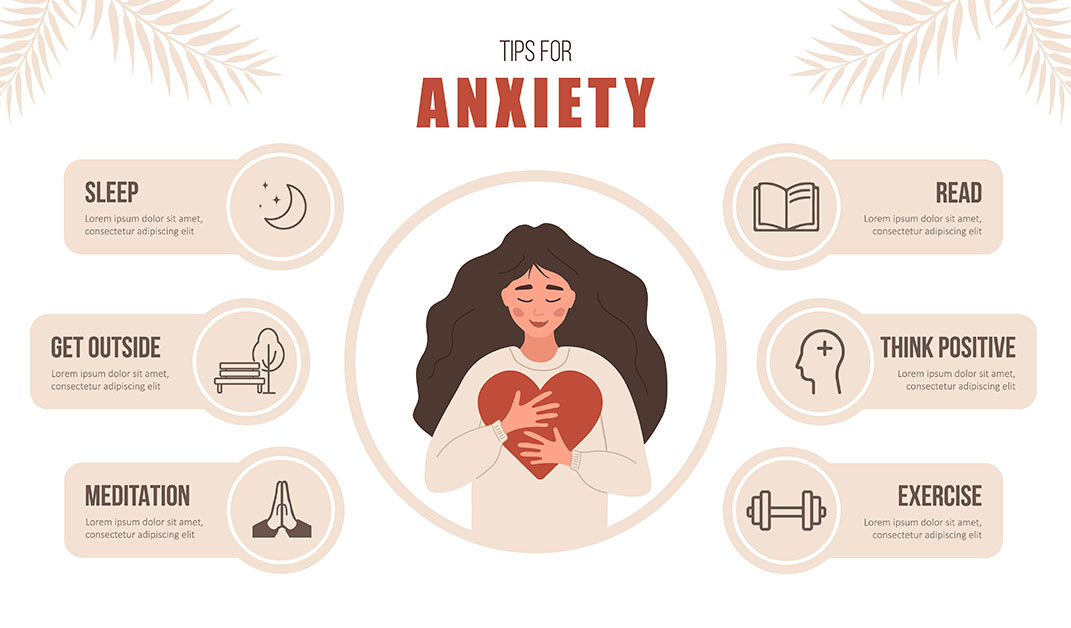Join Our eNewsletter!
Subscribe to our monthly newsletter to receive encouraging advice to help you lead a healthy lifestyle.

The Connection Between Anxiety and Heart Disease
You've just dealt with a stressful situation, and suddenly your heart starts to race; you begin to sweat and tremble, have chest pain, and feel like you can't breathe. You think you may be having a heart attack, which only adds to your anxiety. What you may actually be having is a panic attack, which is a physical, emotional, and cognitive response to severe anxiety.
The symptoms of a panic attack and a heart attack may feel similar, but chronic anxiety and heart disease might also be related. Increasing research suggests that people who experience frequent anxiety may also experience certain physiological effects that can lead to heart conditions. A study published in the Archives of General Psychiatry in 2010 revealed that there's a 74% greater risk of cardiovascular events in those with an anxiety disorder.
Conversely, serious cardiovascular incidents, such as heart attack and stroke, can contribute to mental health disorders, including anxiety. This may be due to the physical, emotional, and financial issues that can arise in the aftermath of a cardiac event.
How Anxiety May Cause Heart Conditions

There are several anxiety-related factors that may increase the chances of developing heart disease.
- Physiological effects - Chronic anxiety can cause persistent elevated heart rate and blood pressure, reduced blood flow to the heart, and increased levels of cortisol, which can all lead to plaque buildup in the arteries, heart disease, or metabolic disease. In short, chronic anxiety puts a significant extra strain on the heart.
- Anxiety medication - Some antipsychotic medications used to treat severe anxiety could contribute to obesity, insulin resistance, diabetes, and atrial fibrillation, which can all increase the risk of cardiometabolic disease, heart attack, and stroke.
- Unhealthy habits - Struggling with anxiety can lead to adopting behaviors that increase the chance of developing heart disease, such as smoking, overeating, and consuming too much alcohol.
Reducing Your Chances of Anxiety-Induced Heart Disease

It's easier said than done, but getting your anxiety under control is the best way to help prevent it from contributing to a cardiac event.
Seek help. If you're not already seeing a mental health professional or physician about your anxiety, make an appointment as soon as possible. They'll help to pinpoint the source of your anxiety as well as diagnose and treat any conditions that may be causing your anxiety.
Assess your treatment. Since some anxiety medications may contribute to conditions that can lead to heart disease, if you're currently taking antipsychotics, ask your mental health professional or physician if there are alternative medications or treatments for your anxiety disorder. Alternative treatments may include cognitive restructuring and exposure therapy.
Reduce stress. While you may not be able to control your situation, you can take measures to alleviate stress, such as practicing yoga, meditating, and exercising, which can in turn help lessen your anxiety.

Break bad habits. Turning to unhealthy behaviors to cope with anxiety - smoking, drinking, and overeating - may make your anxiety worse and significantly increase your risk of heart disease. Try consuming fewer calories and making healthy food choices, including fruits, vegetables, and lean proteins. Also, look for healthier ways than drinking and smoking to cope with anxiety, such as taking up a relaxing hobby or exercising regularly.
If you believe you may be suffering from an anxiety disorder, make an appointment to see a Kelsey-Seybold primary care care physician by calling 713-481-5347, or seek the help of a mental health professional.








